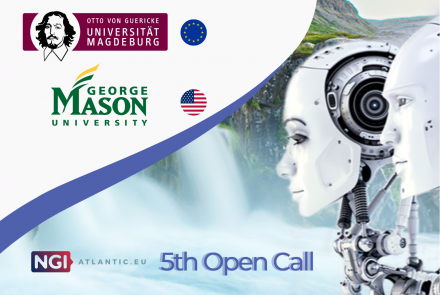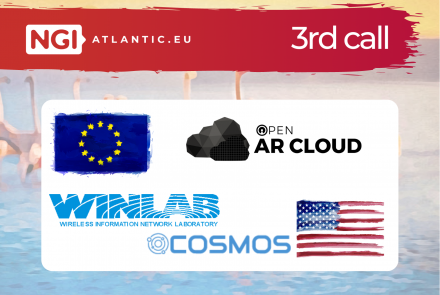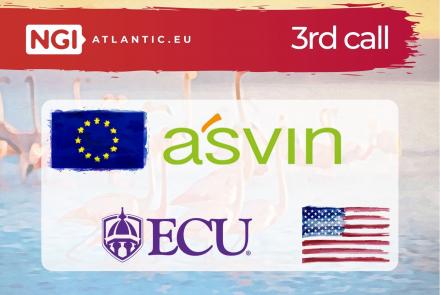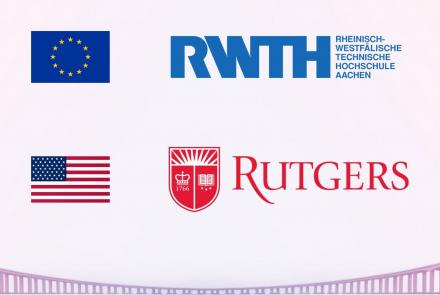The NGIAtlantic.eu project has ended in February 2023. For the follow-up initiative, visit NGI Transoceanic.

Project Coordinator (EU) :
Otto-von-Guericke-University MagdeburgCountry of the EU Coordinator :
GermanyOrganisation Type :
AcademiaStarting date :
Leveraging Path Diversity to Enhance Resilience, Scalability and Energy-Efficiency with SCION
Experimental Platform interconnections
SCION is a novel NGI architecture that has reached a level of maturity, which renders it ready today for large-scale deployment. Thus, the objective of this project is to deploy SCION over the NSF BRIDGES infrastructure over two very high-speed transatlantic links. GMU will enable and support the SCION deployment on NSF BRIDGES, with OVGU providing a European SCION testbed over GEANT. Our project demonstrates the SCION benefits by means of experiments between the US and Europe over the SCIONLab testbed to show the privacy-enhancement (e.g., by splitting traffic over multiple paths) and improved reliability (e.g. with multi-path and seamless path failover) over SCION, as well as the scalability of our SCION-based path discovery mechanisms which help to effectively reduce the network’s power consumption and incentivize ISPs and transit providers to shift towards greener electricity.

Project Coordinator (EU) :
Open AR Cloud Europe gUGCountry of the EU Coordinator :
GermanyOrganisation Type :
Non-profit OrganisationDeployment and Evaluation of a 5G Open Spatial Computing Platform in a Dense Urban Environment
Discovery and identification technologies
The vision of an augmented reality (AR) cloud is about an enhanced version of the real world extended by persistent, location-anchored digital objects. In this project, we adapt and advance various components of the Open Spatial Computing Platform (OSCP) to become deployable at multiple testbeds. We deploy the platform at the COSMOS 5G testbed and produce tutorials and best practices for building and using maps of spaces in AR cloud experiences. We create a new OSCP reference client in Unity and build representative demo applications that allow virtual objects to persist throughout space and time.

Project Coordinator (EU) :
Asvin GmbHCountry of the EU Coordinator :
GermanyOrganisation Type :
SMEPhysical Unclonable Functions for Identification of Large Scale distributed IoT Assets
Decentralised data governance - experimentation of results
A secure bootstrapping is the foremost step for an IoT device to become part of a critical, heterogeneous network. A complete, advanced bootstrapping process can help to close the security loopholes and provide defence against the attacks. asvin has developed a secure bootstrapping process with integration of decentralized and distributed technologies, to uniquely identify an IoT device and perform required authentication and authorization.
The core goal of the project is to verify and validate the solution at large scale using high computing resources on Virtual Wall and Binding Research Infrastructures for the Deployment of Global Experimental Science (BRIDGES) testbeds, in close collaboration of asvin GmbH (EU) and East Carolina University (US). Additionally, the distinctive and complementary characteristics of both testbeds will be employed to optimize the efficiency of the solution by analysing the data generated by the experiment.

Project Coordinator (EU) :
Rheinisch-Westfälische Technische Hochschule AachenCountry of the EU Coordinator :
GermanyOrganisation Type :
AcademiaStarting date :
Experimental Study of Context Based Routing Using Deep Reinforcement Learning
Diversity of applications within the future Internet results in the need to support wide range of values for key performance indicators (KPIs) such as throughput, latency, delivery rate, etc. To be able to satisfy the target performance, it is crucial to make routing at the network edge intelligent. Our experiment combines machine learning techniques with contextual information like the number and type of users to build more accurate inference about the state of the network and to configure routes that are customized for different applications.
